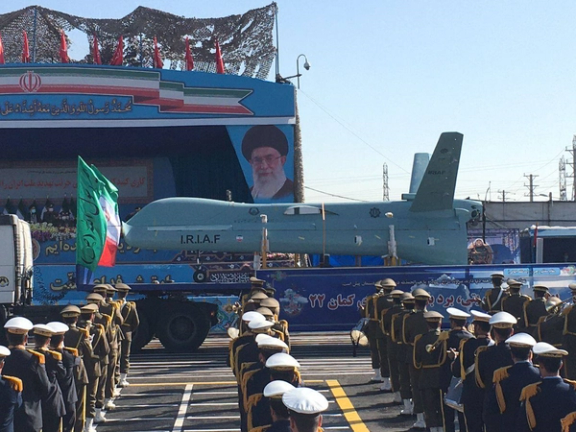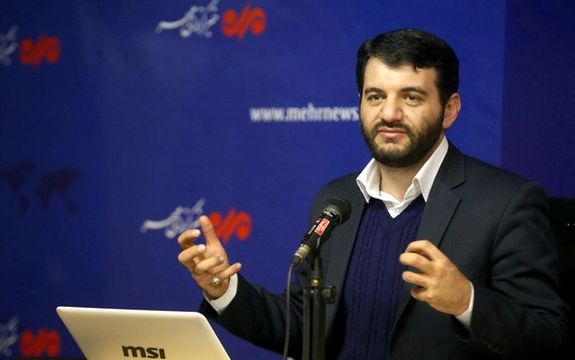Australian Academic Recounts Her Ordeal In Iranian Prisons

Kylie Moore-Gilbert, academic previously jailed in Iran for over two years, has recounted her harrowing ordeal in the Islamic Republic’s prisons.

Kylie Moore-Gilbert, academic previously jailed in Iran for over two years, has recounted her harrowing ordeal in the Islamic Republic’s prisons.
Having spent time in two of the most notorious Iranian prisons -- Evin and Qarchak – she tells the readers how she was pushed to the limit of her endurance by extreme physical and psychological deprivation as she was held in a filthy solitary confinement cell for months, and subjected to relentless interrogation.
She narrated how she began adopting a strategy of resistance against her captors through multiple hunger strikes, letters smuggled to the media, and coordinated protests with other prisoners, as well as an escape attempt that led to her transfer to the isolated desert prison Qarchak.
She was arrested at Tehran Airport by Iran’s Revolutionary Guards on September 12, 2018, was convicted of espionage in a closed-door trial, and was sentenced to 10 years in prison.
Moore-Gilbert, who is a lecturer in Islamic Studies at Melbourne University, was released in November 2020 in a prisoner swap with three Iranian prisoners in Thailand, two of whom had been convicted in connection with a bombing plot in Bangkok in 2012.

Families of two German and two Austrian citizens currently jailed in Iran have called on the governments in Berlin and Vienna to demand their release as part of nuclear talks with Tehran.
In an open letter to German and Austrian foreign ministers published in Die Welt on Monday, the families of Nahid Taghavi, Jamshid Sharmahd, Kamran Ghaderi, and Masoud Mossaheb urged their respective governments to show they are committed to human rights.
The families questioned whether the two governments were doing enough to confront the Islamic Republic over its “hostage-taking” policy — targeting foreign citizens to use as bargaining chips to settle disputes with European governments.
“When, if not now, would it be time to publicly name our loved ones; to stand behind them, your citizens, and to demand their release with all vehemence?”, they asked Annalena Baerbock and Alexander Schallenberg.
Taghavi, 67, a German-Iranian rights activist is imprisoned since October 2020 and is sentenced to 10 years, while, Sharmahd, 66, is kept in isolation at a secret location since he was snatched by Iranian agents while travelling to India in August 2020. Sharmahd is accused of involvement in a 2008 mosque bombing in Iran that killed 14 people.
Mossaheb, 75, an engineer; and Ghaderi, 58, a businessman, are both held in Evin prison after each was sentenced to a decade in what rights groups say were unfair trials.

Iranian civil and human rights defender Narges Mohammadi who has returned to prison after an open-heart surgery is denied her medications, her lawyer says.
Mostafa Nili said on Tuesday that despite the delivery of the medicines to the Qarchak Prison, the authorities have refused to hand them over to Mohammadi, who was on furlough for the surgery until last week.
He said that Mohammadi has a coronary stent in one of her main arteries and must take her heart medication regularly.
Nili added that any delay in taking the medications can make the treatment process ineffective and even endanger her health.
Taghi Rahmani, her husband, had told Radio Farda that doctors believe she needed a longer period of recovery before she had to return to prison.
In a five-minute trial in late January, she was sentenced to eight years in jail and 70 lashes by Branch 26 of the Revolutionary Court, for trumped-up political chagres.
Mohammadi was arrested in November last year at the death anniversary of a victim shot by security forces during the November 2019 protests, reportedly while shopping.
She has been to jail several times over the past two decades. She was freed from Evin Prison in September 2020 after serving more than five years when she had no contact with her husband and children for long periods of time.
Persecution of human rights and political activists and executions have increased since hardliner president Ebrahim Raisi took office last August.

A man with an Iranian name and an accomplice with Pakistani ties who were arrested in Washington DC for impersonating federal agents have been indicted by a federal grand jury.
Arian Taherzadeh and Haidar Ali were arrested earlier this month by the FBI when it came to light that they were impersonating Homeland Security agents and had established ties with Secret Service agents, lavishing gifts on them. One agent was a member of First Lady jill Biden’s protection detail.
They were indicted Tuesday on charges of false impersonation of a federal agent and possession of a large-capacity ammunition device. The suspects had a range of law enforcement paraphernalia in their possession when they were arrested, including body armor and surveillance equipment.
Their scheme required a considerable amount of money, and it is not clear how they financed their operation. They offered expensive rent-free apartments, guns, iPhones and other gifts to federal agents.
A judge on April 8 released them from detention on the grounds that prosecutors had not established a foreign connection, but Haidar Ali’s passport shows he had Iranian visas and might have traveled to Iran in recent years.
It is not clear if prosecutors will appeal the decision of the judge to release the suspects into the custody of their families after the grand jury indictment.

Iran’s Revolutionary Guard (IRGC) and the traditional Army commanders on Tuesday claimed they have achieved progress in building unmanned aerial vehicles.
IRGC Commander-In-Chief Major General Hossein Salami and Army Commander-in-Chief Major General Abdolrahim Mousavi, speaking at a ceremony described the country’s drone industry as “valuable and empowering”.
“Manufacturing UAVs with its various technologies is very significant today in both the Army and the IRGC”, Salami said.
Praising the self-sufficiency in military technology in the Army, especially in the Air Force, Mousavi said the Army has made good progress in building fighter jets and helicopters and their components.
Most of Iranian-made fighter jets, such as Kowsar, Saeqeh, and Azarakhsh, are mainly based on the American Northrop F-5, with some analysts describing them to be inefficient as a weapon but having potential for training a new generation of fighter pilots.
The US and Israel pioneered the use of drones in the Middle East, although China has now become a major supplier, selling to Egypt, Iraq, Saudi Arabia, and the United Arab Emirates. Iran and Turkey have developed indigenous production.
The two military commanders also stressed the importance of closer cooperation and focusing their efforts on areas such as electronic warfare – using electromagnetic spectrum or directed energy to an enemy or impede enemy assaults.
Iran showcased some of its latest drones Monday on Army Day, including the "strategic multi-functional combat drone" Kaman-22 and the single-engine multirole tactical drone Ababil-5.

In a first-ever revolt by Iranian government employees against a cabinet minister, hundreds gathered on Tuesday to reject Hojjat Abdolmaleki's leadership.
Twitter users in Iran reported that some employees also gathered at the ministry's parking area and courtyard chanting slogans against Labor Minister Hojjat Abdolmaleki who had told the press in February that he had fired over 1,000 employees.
Pictures of the protest published by Iranian news outlets including Rouydad24 website, show the employees waiting for the minister to come forward and answer their questions. However, he did not leave his office at the ministry.
Employees also accused Abdolmaleki of launching a publicity to show off his "achievements" despite criticisms by staff and the media over his populist behavior. Some Twitter user published a publicity poster, adding that Abdolmaleki has used the ministry's funds to showcase his performance. Several members of the Iranian parliament have said that Abdolmaleki will be one of the first Raisi ministers to be impeached as soon as the parliament’s leadership allows impeachment motions to be tabled and go forward.
Reports from Tehran say Deputy Labor Minister Mohammad Reza Hosseini tried to calm the protestors, but his effort was not successful. The employees chanted "Payments with Justice" demanding fair pay.
One employee told Rouydad24: "It is ironic that the staff of other government and private companies come to the labor ministry to voice their grievances while its own employees have nowhere to go to seek relief for their grievances."

Another employee asked: "How can the labor minister manage the situation of unemployment in the country while he cannot sort out the problems in his own ministry?" He reminded that Abdolmaleki promised to quickly create millions of jobs in Iran at low cost, but it never materialized.
Other employees criticized the minister and his aides for putting on a show rather than working to solve staff problems. One employee told reporters that Abdolmaleki made no plans to tackle unemployment in Iran since he assumed office eight months ago. Earlier, Abdolmaleki had said in an odd comment that "Creating jobs was not among the responsibilities of the labor ministry."
Criticism of other economic ministers of the Raisi administration has also been on the rise during the past months. Lawmaker Behrouz Mohebbi on Tuesday harshly criticized Industry Minister Reza Fatemi Amin who is also on the parliament's impeachment list, charging that he has not met any one of the many promises he made before joining the government.
Mohebbi further charged that the managers of car manufacturing companies affiliated with the Ministry of Industry drive foreign cars and do not care about the rising price and falling quality of Iranian-made cars. "If they used Iranian cars, they would have made efforts to improve the quality of domestic products at least for their families' safety," he said.
Mohebbi also criticized the minister for failing to control the car market. According to the media last week, the price of a basic old model compact car called Pride, rose by 400 million rials ($1,600) overnight and reached 2 trillion rials.
Mohebbi said, "when Fatemi Amin's credentials were being reviewed at the parliament, he promised to put an end to the monopoly of the two car makers affiliated with the ministry, to boost production and to improve quality. Some eight months on, none of these promises have materialized." He reminded Fatemi Amin that even Supreme Leader Ali Khamenei has acknowledged that people are unhappy about his ministry's performance.